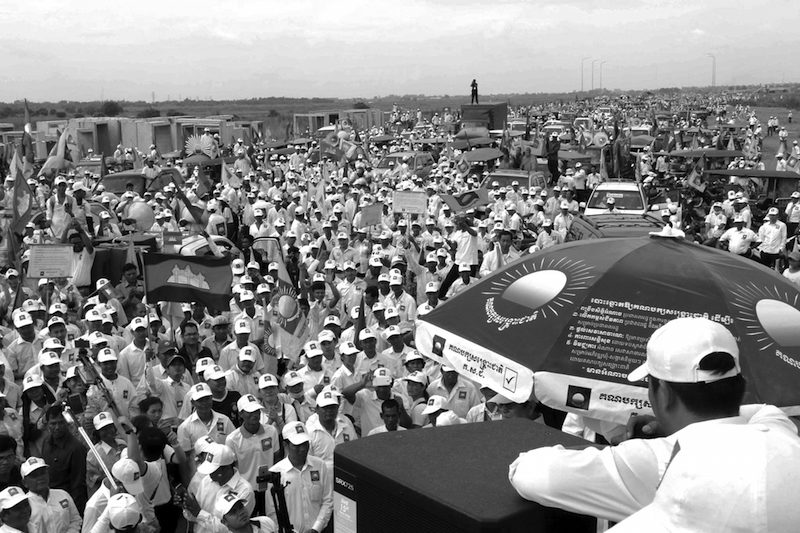Skirting the fiery rhetoric of some of its past rallies and the strong response from authorities that it often elicited, the CNRP kicked off its commune election campaign with a message of change.
At a procession that drew thousands of supporters in Phnom Penh on Saturday, party president Kem Sokha promised a number of reforms once—not if—his party comes to power next year.

“To change or not? Remove or not?” Mr. Sokha asked on Saturday morning from the bed of a truck on Hun Sen Boulevard.
“Change! Change! Change!” a sea of supporters chanted back.
Saturday kicked off a two-week campaign period for the June 4 commune vote that is being closely watched as a bellwether for next year’s national election. Mr. Sokha has taken the opposition campaign on a tour through the provinces, while the CPP will stick to smaller commune-level events before holding large rallies across the country on the final day of the campaign period.
Hundreds of trucks, tuk-tuks and motorbikes meandered north and then west over the span of at least seven hours on Saturday, avoiding confrontation with authorities after city officials instituted rules restricting parties from campaigning along several sections of major roads, markets, and parks.
The new party president used speeches on Saturday as well as at another rally yesterday in Kampot province to emphasize the party’s plans to empower local government and avoid the corruption and land grabbing that he suggested characterized the current regime.
“After 2018, when the CNRP leads the country, if you want to build canals, ponds, toilets, dirt roads, you will have your own financial package. You won’t need to beg the Ministry of Rural Development,” he said yesterday.
Mr. Sokha vowed to eliminate the ministry if elected, repeating his party’s plan to provide $500,000 in annual funding to each commune to lead their own infrastructure projects and suggesting on Saturday that the amount could be doubled.
He did not elaborate on the details of the proposal, which would cost approximately $800 million to $1.6 billion, depending on how much funding each of the 1,646 communes received.
With Prime Minister Hun Sen warning that an opposition victory would spark civil war and Defense Minister Tea Banh threatening last week to “smash the teeth” of protesters who disputed the election results, Mr. Sokha used a stop in Kampot province yesterday to paint his party’s non-violent alternative.
“I want to say that CNRP victory will not be achieved using threatening acts, insults and intimidation to get votes,” he said to hundreds of supporters. “There will be no land-grab- bing from the people, logging, corruption or theft of national resources. We will end it when the CNRP leads the country.”
Council of Ministers spokesman Phay Siphan said it was a mistake to conflate the actions of individuals with the government.
“It’s a person,” he said of the perpetrators of corruption and land grabs. “It’s not the government. It’s not any political party.” Mr. Siphan also called the work of the Rural Development Ministry “very important,” saying the government’s program of decentralization had led to a more empowered grassroots form of governance.
But Mr. Sokha’s message appeared to resonate with his base in Phnom Penh, who came out on Saturday in a crowd that party spokesman Yim Sovann estimated at upward of 20,000, though that number could not be independently confirmed. (The ruling party claimed between 50,000 and 110,000 supporters at its two Phnom Penh events over the weekend, with those estimates likewise unverified.)
CNRP supporters waved flags and wore shirts and baseball caps emblazoned with the party logo of a rising sun.
“I’ve seen that most ruling party officials don’t pay attention to the people,” said Phann Lin, a 42-year-old maid who stood out in the predominantly male crowd in Phnom Penh. “They have no intention to solve people’s issues.”
Pheng Ratha, a 63-year-old party supporter who retired to Cambodia in 2010 after fleeing the country for Switzerland in the wake of the Khmer Rouge regime, said it was time for fresh blood.
“The CPP has had more than 30 years,” he said in French. “They have done nothing…. They don’t respect human rights.”
Supporters and onlookers said the mood was mellower than the last time the party took to the streets en masse in the wake of the disputed 2013 national elections.
Munineath Sok, a 25-year-old draftsman for a construction company who watched the procession from the air-conditioned comfort of a Tela Mart convenience store, estimated he had spent an hour watching the procession pass, but said turnout was also lower than some marches in 2013.
Mr. Sok said he stayed away from all party rallies, fearing some “unintentional accident,” but said he would vote for the party that spurred economic growth and job creation.
“With our economic growth, many people will have jobs and their lifestyles will be better,” he said.
His friend, 26-year-old Eng Keang, who held a post at the Labor Ministry, suggested he would inevitably cast his vote for the ruling party.
When asked if that decision was at all motivated by his employer, Mr. Keang declined to respond.
“You know how it is in Cambodia,” he said.